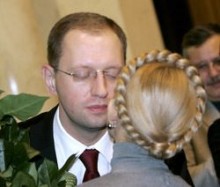On Feb. 27, 2009, President Viktor Yushchenko urged politicians to announce a moratorium on political rows and forget about the presidential elections until July 1. But the president’s appeal came clearly too late. The election campaign already started, without his assistance. Viktor Yanukovych, Yulia Tymoshenko, and Arsenii Yatseniuk are the three current leaders. There is not a hint of Yushchenko there. Seeing this situation, some lucid minds in the BYuT started thinking about making friends with Yatseniuk.
Vice Speaker of the Verkhovna Rada Mykola Tomenko dared express several critical remarks about Tymoshenko in his interview to Ukrainska Pravda. In particular, he considers that the spoiler candidate Yatseniuk should not be [politically] “destroyed.” On the contrary, the rival should be transformed into an ally. “As a voter I would propose the following formula: President Tymoshenko, Prime Minister Yatseniuk, and Speaker Lytvyn.”
However, nobody knows how this “dissident” position will affect Tomenko’s future career, but it should be admitted that the idea is quite reasonable. Instead of waging war, the most logical thing for Tymoshenko to do would be to strike a deal with Yatseniuk, just like she did with Yushchenko in the past. In 2004 Tymoshenko gave up her ambitions and supported Yushchenko in exchange for the post of the prime minister. It worked then. Yushchenko received a strong ally, rallied the entire opposition around himself, and won the presidential race.
The political scientist Volodymyr Fesenko believes that this scheme could work this time, too:
“Of course, Yatseniuk may have presidential ambitions, but he is aware that for him it will be difficult to win. If the ‘orange’ camp splits into two competing wings, this will be a defeat, both for Tymoshenko and Yatseniuk. This will be a defeat in the presidential elections. The only way to victory is an agreement between them. Isn’t it better to make an agreement in advance than to do the same at the final stage of the campaign?
“There is another important nuance. It seems to me that Yatseniuk is more inclined to take up the post of the prime minister. It is more interesting and closer to him. I think that psychologically he is not ready for presidency. However, he has great ambitions. He has held all the important government positions except that of the prime minister and the president.”
Does this mean that Yatseniuk should not run for the presidency?
“It is desirable for Yatseniuk to take part in the presidential elections for the mere purpose of showing that he has a high rating. If he shows the same result in these elections that is recorded by the public opinion polls (10 percent or even more), this will indicate that he may bring a quite large faction to the Verkhovna Rada in the next parliamentary elections. This will indicate that he has become one of the country’s three most popular politicians. This is very important for him. From the rational viewpoint of the political science, participation in the presidential elections is necessary for him. But in this case he will have to reach an agreement with Tymoshenko that the competition between them will be fairly constructive, without a political war. This is because there are different kinds of competition. They can sign an agreement to the effect that the one who advanced the second round will get the support of the other.”
What is your assessment of the chances of other “new” politicians? Do they need to participate in the elections?
“Yatseniuk has had an edge over Hrytsenko so far, probably because he better matches certain expectations concerning ‘young and intelligent people.’ Hrytsenko is somewhat older. Now his presidential rating is at 1.5 percent. Thus, the gap between them is very large. Moreover, judging from the public opinion polls, practically everyone knows Yatseniuk. Only three percent of the respondents do not know him. And a total of between 15 and 20 percent of respondents don’t know Hrytsenko. Hrytsenko is less active in terms of his informational campaign; he has not managed to create an efficient team. There might also be some problems with shaping his image for the public. Yatseniuk is more relaxed, wittier, and this must be appealing to voters.”
The civic movement For Ukraine has been recently launched. In your opinion, can Viacheslav Kyrylenko try to take part in the presidential elections?
“In principle, Kyrylenko may run for the presidency. But his rating now is lower than Katerynchuk’s. Although Katerynchuk had problems after Kyiv’s elections, according to the data of the FOM-Ukraina, the level of trust to Katerynchuk is higher than the level of trust to Kyrylenko. These are the paradoxes of public consciousness. From this angle, even Hrytsenko is more promising. Kyrylenko is losing in ratings because he remains Yushchenko’s ally. He has an image of a dependent politician. Therefore Kyrylenko does not have any presidential rating. Even Vitali Klitschko’s rating as a presidential candidate is at nearly one percent, while Kyrylenko is not even being included in the polls.”







